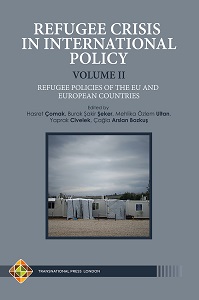Refugee Policies of The Baltic Countries
Refugee Policies of The Baltic Countries
Author(s): Burulkan Abdibaitova Pala
Subject(s): Migration Studies, Asylum, Refugees, Migration as Policy-fields
Published by: Transnational Press London
Keywords: Migration Series; EU; European Union; immigrants; international policy; migration policy; refugee crisis; refugee law; refugee policy; refugees;
Summary/Abstract: The international community, and particularly wealthy nations, fail to share the responsibility to protect people fleeing their homes in search of safety. In other words, they cannot agree and support a fair and predictable system to protect people who are forced to leave everything behind because of violence and persecution. The European Commission has designed a quota system to distribute refugees among member states, using criteria such as population size, GDP, unemployment rates and the number of asylum applications received in the past. The mandatory quota proposal has strained relations between Western, Eastern and Central European member states. This was due to some countries bearing a disproportionate burden. Western European states, such as Germany, accept large numbers of refugees while Eastern European states are reluctant to share the burden.
Book: Refugee Crisis in International Policy - Volume II Refugee Policies of the EU and European Countries
- Page Range: 133-152
- Page Count: 20
- Publication Year: 2021
- Language: English
- Content File-PDF

